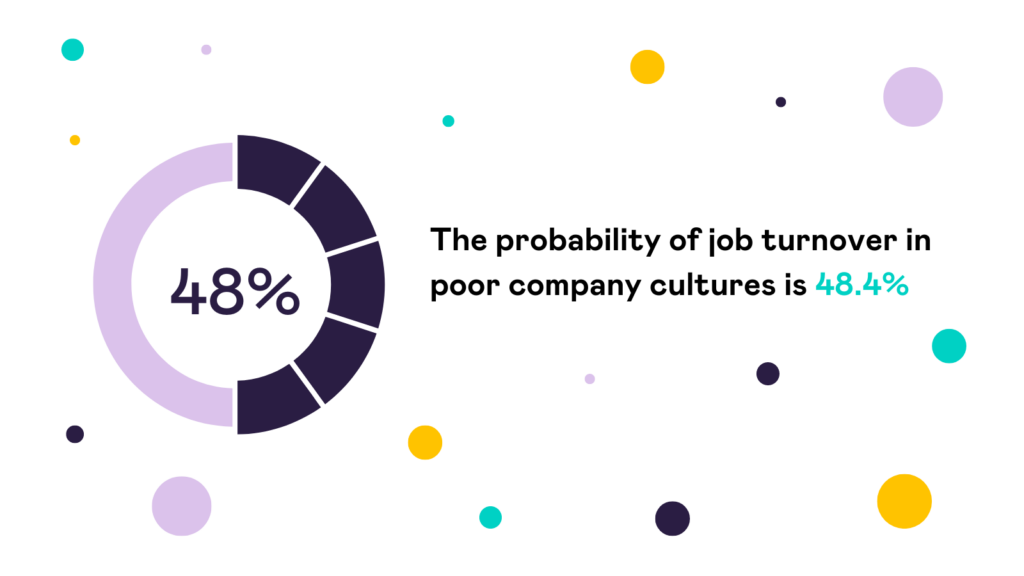It’s one thing to know you want a high-performing or nurturing company culture and quite another to communicate it – let alone achieve it!
Being able to pinpoint exactly what your unique culture is about and how it supports your organisational goals is incredibly useful. While it may feel tricky to encapsulate your entire ethos in only a few words, it really is doable – especially when you have a few tricks up your sleeve.
Dive in for our take on solidifying your culture and finding a straightforward and successful way to communicate it.
What is Company Culture?
There’s no hard and fast rule on what exactly company culture is, but when we talk about it, we talk about all the various parts that make a company what it is. That includes everything like:
- Your values and company mission statement
- Your leadership styles
- The kind of office perks you offer
- Your employee recognition and rewards
- The relationships between your employees
Essentially, your culture is an amalgamation of all the components that contribute to your everyday operations, atmosphere, and overarching goals.
Why is Company Culture Important?
Having a company culture and sharing it is very important if you want your team to thrive. It sets expectations for how employees are expected to behave and relate to each other.
It’s also what differentiates you from other organisations. A good culture can give you a competitive edge when it comes to hiring and retention. In fact, according to a Jobvite survey, 13% of job seekers have turned down offers due to the company culture of the hiring organisations.
To add to that, a Columbia University study found that the probability of job turnover in poor company cultures is 48.4%. So it’s clear that a good culture is essential if you want to hang on to your talent.

What Defines a Healthy Corporate Culture?
The best kind of corporate culture is one that promotes respect, trust, mutual recognition and shared values. It is all about making sure that your whole team feels engaged and listened to.
This may be trickier to achieve than it sounds, but honesty, openness to feedback, a strong employee recognition program and empathetic leadership are all key components that can help create the kind of culture people enjoy being a part of.
Effective Ways to Describe Your Culture
When looking for ways to describe your culture, asking yourself a few questions and using the answers as your building blocks is useful. For example:
- What is your company mission and what does it aim to accomplish? Do you want to provide the best customer experience possible and create products people just can’t live without?
- What kind of environment do you encourage in your offices? If teamwork is important to you, then cutting teams off into small cubicles isn’t going to help your culture thrive.
- What are your values and ethics? Do you believe in trust, integrity, employee engagement, diversity or work-life balance?
- What are your employees like? What are their priorities? Can your team interact with each other or do they tend to ignore one another and sit with headphones on during their time in the office?
Don’t Make This Mistake When Describing Your Company Culture
One very common mistake organisations tend to make is describing their culture as ‘family’.
You might think it’s a nice-sounding sentiment, and may even feel accurate in your team. But it can also blur the boundaries between work and home life, making employees feel as though they are always expected to go above and beyond, sacrificing their well-being and causing employee burnout.
Examples of Great Company Culture
A good company culture allows individuals to thrive while creating a cohesive working atmosphere. There are a few different ways this can be achieved, and we’ve put together a list of some of the most effective ones. Just be aware that the best cultures will probably have some crossover and many of these elements in common!
A High-performing Culture
This is the kind of culture that can help drive excellence.
It encourages high-performing teams and highlights individual and organisational growth potential. While there are massive benefits to this kind of culture, it is also a good idea to keep a close eye on working hours and well-being to safeguard against overperformance and burnout.
Handy words to describe it: Enriching, stimulating, exciting, motivational.
A Nurturing Culture
Especially effective for small organisations, nurturing company cultures puts team members and their well-being first.
This can create strong feelings of loyalty and help employees feel safe to grow and experiment. Kindness and care are central to this style, and buy-in is needed from everyone. But the payoff can be huge – according to Forbes, happy employees are 31% more productive than unhappy ones.
Handy words to describe it: Caring, friendly, warm, social, supportive.
A Role-focused Culture
When you have a lot of highly skilled individuals with diverse abilities, a role-focused culture allows the flexibility for projects to be led by expertise rather than position.
This is an egalitarian approach best suited to organisations with a particularly talented and specialised set of employees.
Handy words to describe it: Skilled, flexible, independent, individualistic, respectful.
A Strong Leadership Culture
With a focus on strong and capable leadership, this is a culture that can leave employees feeling safe and secure. This is the perfect culture for disruptive leaders to flourish.
Leaders who are driven and transparent inspire confidence – but this culture isn’t all about employees who follow blindly. Instead, there should be many opportunities for growth through coaching and mentoring, and managers should be primed to invest in employees who have potential.
Handy words to describe it: Focused, driven, passionate, inspiring, inclusive.
How to Build a Strong Culture
1. Define and Communicate Company values
Your culture has to grow from your company’s core values. They should reflect the way that you want your company to be perceived and your team to behave, and interact with one another.
You must take the time to bring your team into the value definition process so that they feel ownership over the result. Once your values are defined, reinforce them by regularly recognising employees who live your values.
2. Prioritise Employee Well-being
Taking care of your employees has to run much deeper than offering occasional free pizza. A strong company culture makes the well-being of its employees a top priority. You can enable work-life balance by offering flexible working and role modeling switching off from work outside of work hours.
Ensure that your people feel valued by regularly recognising their contributions, both big and small. When your team feel like the company cares about them as an individual, engagement will improve, and enhanced productivity and performance will follow.
3. Ensure Leaders Model Positive Behaviours
Leading by example is an incredibly powerful tool in building a positive company culture. “Do as I say, not as I do” really doesn’t work in the workplace. As a leader, you have to model the attitudes and behaviours that you want to see in your team.
Encourage open communication, provide constructive feedback, and foster a supportive environment. Actively live your company values, be transparent, and treat everyone with respect. When leaders act as positive role models, it inspires employees to do the same, creating a positive ripple effect throughout the company and improving your culture.
Transform your culture with Mo

- Improve employee engagement scores
- Reduce employee churn
- Build a collaborative culture
Describing Company Culture: Key Takeaways
- Company culture encompasses various elements such as values, leadership styles, office perks, employee recognition, and relationships between employees, contributing to everyday operations and overarching goals.
- A strong company culture is crucial for employee engagement, setting expectations for behaviour, differentiation from competitors and reducing turnover rates.
- Effective ways to describe company culture include defining company values, prioritizing employee well-being, ensuring leaders model positive behaviours, and choosing suitable terms to characterise the culture, such as high-performing, nurturing, role-focused or leadership-focused.




